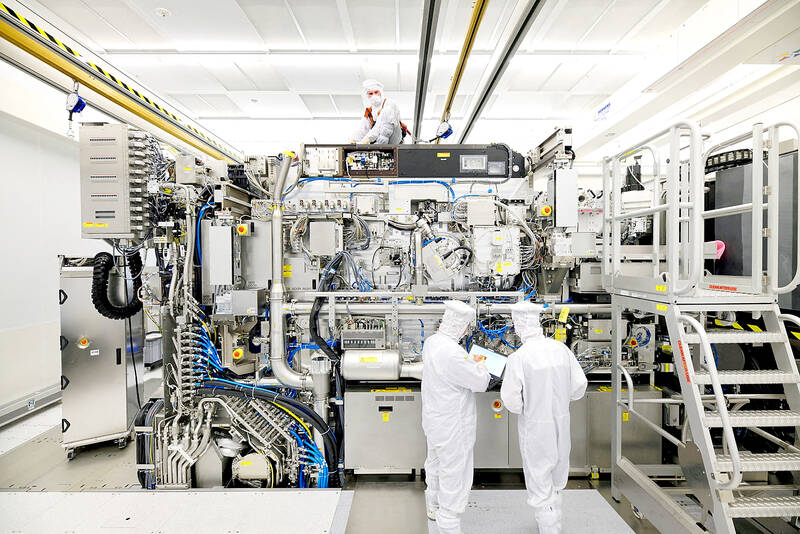The administration of US President Joe Biden is imposing new export controls on critical technologies including quantum computing and semiconductor goods, aligning the US with allies working to thwart advancements in China and other adversarial nations.
The rules target quantum computers and components, advanced chipmaking tools, a cutting-edge semiconductor technology called gate-all-around, and various components and software related to metals and metal alloys. They cover all worldwide exports, but include exemptions for nations that implement similar measures. That group includes Japan and the Netherlands, among other allies, and the US anticipates that more nations would follow, the US Department of Commerce said in a statement.
Washington has been cracking down for years on China and other adversaries’ ability to access cutting-edge technologies needed for artificial intelligence (AI), over fears that advanced chips and components could lend Beijing a military edge.

Photo: ASML via Reuters
The US effort has included unilateral measures that Washington has tried to coordinate with a handful of key allies — such as sweeping semiconductor export controls first imposed in 2022 — as well as restrictions negotiated through a broader international framework, such as those issued on Thursday.
“Aligning our controls on quantum and other advanced technologies makes it significantly more difficult for our adversaries to develop and deploy these technologies in ways that threaten our collective security,” US Undersecretary of Commerce for Industry and Security Alan Estevez said in a statement.
Thursday’s action opens a 60-day public comment period before officials issue a final rule.
The US has separately been working on a massive new package of chip-related export controls that would target China’s access to so-called high-bandwidth memory chips, an essential AI component, as well as a range of semiconductor manufacturing tools, Bloomberg has reported.
That effort includes measures with a global focus — but with exemptions for key allies including Japan and the Netherlands, home to two of the most important companies in the chip supply chain.
In related news, the Dutch government yesterday announced broader restrictions on exports of machines that produce semiconductors.
The measure, to take effect today, is set to have a further impact on Dutch technology giant ASML Holding NV, a global leader in the cutting-edge industry.
“I’ve made this decision for reasons of security,” Dutch Minister for Foreign Trade and Development Cooperation Reinette Klever said in a statement. “We see that technological advances have given rise to increased security risks associated with the export of this specific manufacturing equipment, especially in the current geopolitical context.”
The new restrictions would apply to “more types of equipment” on top of curbs that have been in force since September last year, the government said.
ASML would have to apply for government authorization to export the machines.
The Dutch government said that the equipment can be used to produce advanced semiconductors which “in turn play a key role in advanced military applications.”
Additional reporting by AFP

SECURITY: As China is ‘reshaping’ Hong Kong’s population, Taiwan must raise the eligibility threshold for applications from Hong Kongers, Chiu Chui-cheng said When Hong Kong and Macau citizens apply for residency in Taiwan, it would be under a new category that includes a “national security observation period,” Mainland Affairs Council (MAC) Minister Chiu Chui-cheng (邱垂正) said yesterday. President William Lai (賴清德) on March 13 announced 17 strategies to counter China’s aggression toward Taiwan, including incorporating national security considerations into the review process for residency applications from Hong Kong and Macau citizens. The situation in Hong Kong is constantly changing, Chiu said to media yesterday on the sidelines of the Taipei Technology Run hosted by the Taipei Neihu Technology Park Development Association. With

CARROT AND STICK: While unrelenting in its military threats, China attracted nearly 40,000 Taiwanese to over 400 business events last year Nearly 40,000 Taiwanese last year joined industry events in China, such as conferences and trade fairs, supported by the Chinese government, a study showed yesterday, as Beijing ramps up a charm offensive toward Taipei alongside military pressure. China has long taken a carrot-and-stick approach to Taiwan, threatening it with the prospect of military action while reaching out to those it believes are amenable to Beijing’s point of view. Taiwanese security officials are wary of what they see as Beijing’s influence campaigns to sway public opinion after Taipei and Beijing gradually resumed travel links halted by the COVID-19 pandemic, but the scale of

A US Marine Corps regiment equipped with Naval Strike Missiles (NSM) is set to participate in the upcoming Balikatan 25 exercise in the Luzon Strait, marking the system’s first-ever deployment in the Philippines. US and Philippine officials have separately confirmed that the Navy Marine Expeditionary Ship Interdiction System (NMESIS) — the mobile launch platform for the Naval Strike Missile — would take part in the joint exercise. The missiles are being deployed to “a strategic first island chain chokepoint” in the waters between Taiwan proper and the Philippines, US-based Naval News reported. “The Luzon Strait and Bashi Channel represent a critical access

Pope Francis is be laid to rest on Saturday after lying in state for three days in St Peter’s Basilica, where the faithful are expected to flock to pay their respects to history’s first Latin American pontiff. The cardinals met yesterday in the Vatican’s synod hall to chart the next steps before a conclave begins to choose Francis’ successor, as condolences poured in from around the world. According to current norms, the conclave must begin between May 5 and 10. The cardinals set the funeral for Saturday at 10am in St Peter’s Square, to be celebrated by the dean of the College